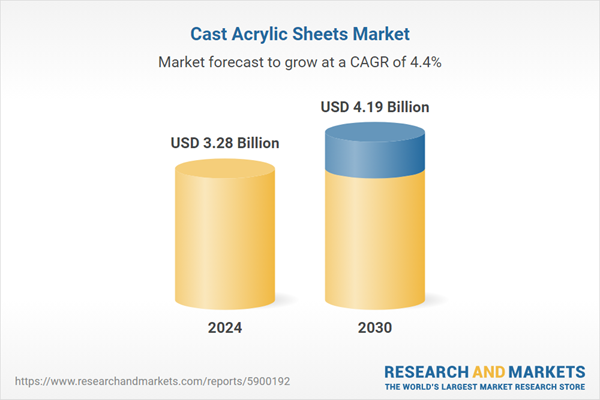Speak directly to the analyst to clarify any post sales queries you may have.
10% Free customizationThis report comes with 10% free customization, enabling you to add data that meets your specific business needs.
Key Market Drivers
Growing Demand of Cast Acrylic Sheets in Automotive Industry
The global demand for cast acrylic sheets is being significantly driven by their rising use in the automotive sector. In 2023, China led global vehicle production with over 26.1 million units, underscoring the region’s influence on material demand. Cast acrylic sheets offer a unique blend of lightweight properties, excellent optical clarity, and superior durability, making them ideal for automotive applications. Manufactured through a specialized cell casting process, these sheets deliver exceptional chemical resistance and high impact strength. Their adaptability in shaping and forming to suit various design specifications adds further value in automotive manufacturing, supporting broader industry adoption.Key Market Challenges
Volatility in Prices of Raw Materials
The cast acrylic sheets market faces considerable challenges due to fluctuating prices of petroleum-based raw materials like acrylic acid and alcohol. As these inputs are directly linked to crude oil markets, any shifts in oil pricing significantly influence production costs, affecting overall profitability. Manufacturers often find it difficult to maintain competitive pricing when raw material costs surge, especially with alternatives like polycarbonate sheets offering cost-effective solutions. This volatility hampers market stability and adds pressure on producers to continually reassess cost structures, adopt efficient production strategies, and differentiate products to retain customers in a highly price-sensitive environment.Key Market Trends
Surge in Technological Advancements
The production of cast acrylic sheets is evolving through continuous technological innovations aimed at enhancing material performance. Advancements have led to stronger mechanical properties, improved impact resistance, and better light diffusion for consistent illumination. Additionally, the incorporation of advanced UV-resistant coatings has expanded the material’s usability in both indoor and outdoor applications by increasing its longevity and resistance to environmental degradation. These developments are not only improving the functional quality of cast acrylic but also expanding its adoption in industries demanding both durability and aesthetic appeal.Key Market Players
- Mitsubishi Chemical Corporation
- Altuglas International Ltd.
- 3A Composites USA Inc.
- Aristech Acrylics, LLC
- Madreperla SpA
- Spartech LLC
- Evonik Industries AG
- Acrilex Inc.
- Irpen SA
- Polyplastics Co. Ltd.
Report Scope:
In this report, the Global Cast Acrylic Sheets Market has been segmented into the following categories, in addition to the industry trends which have also been detailed below:Cast Acrylic Sheets Market, By Type:
- Cell Cast Acrylic Sheet
- Continuous Cast Acrylic Sheet
Cast Acrylic Sheets Market, By Application:
- Signage & Display
- Sanitary Ware
- Architecture & Interior Design
- Automotive
- Others
Cast Acrylic Sheets Market, By Region:
- North America
- United States
- Canada
- Mexico
- Europe
- France
- United Kingdom
- Italy
- Germany
- Spain
- Asia Pacific
- China
- India
- Japan
- Australia
- South Korea
- South America
- Brazil
- Argentina
- Colombia
- Middle East & Africa
- South Africa
- Saudi Arabia
- UAE
Competitive Landscape
Company Profiles: Detailed analysis of the major companies present in the Global Cast Acrylic Sheets Market.Available Customizations:
With the given market data, the publisher offers customizations according to a company's specific needs. The following customization options are available for the report.Company Information
- Detailed analysis and profiling of additional market players (up to five).
This product will be delivered within 1-3 business days.
Table of Contents
Companies Mentioned
- Mitsubishi Chemical Corporation
- Altuglas International Ltd.
- 3A Composites USA Inc.
- Aristech Acrylics, LLC
- Madreperla SpA
- Spartech LLC
- Evonik Industries AG
- Acrilex Inc.
- Irpen SA
- Polyplastics Co. Ltd.
Table Information
| Report Attribute | Details |
|---|---|
| No. of Pages | 185 |
| Published | July 2025 |
| Forecast Period | 2024 - 2030 |
| Estimated Market Value ( USD | $ 3.28 Billion |
| Forecasted Market Value ( USD | $ 4.19 Billion |
| Compound Annual Growth Rate | 4.3% |
| Regions Covered | Global |
| No. of Companies Mentioned | 10 |









